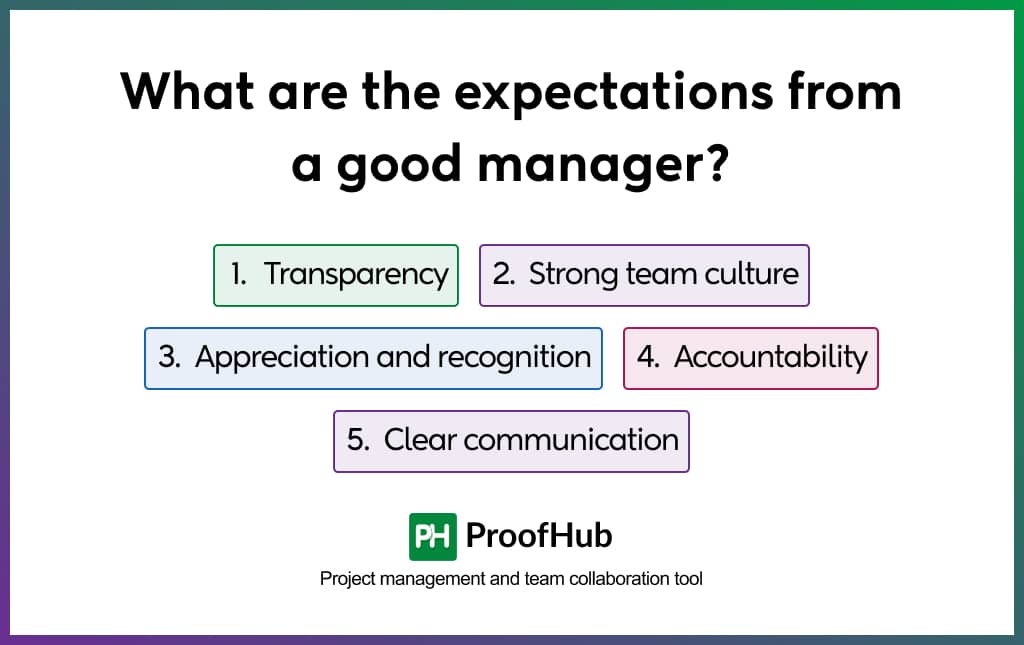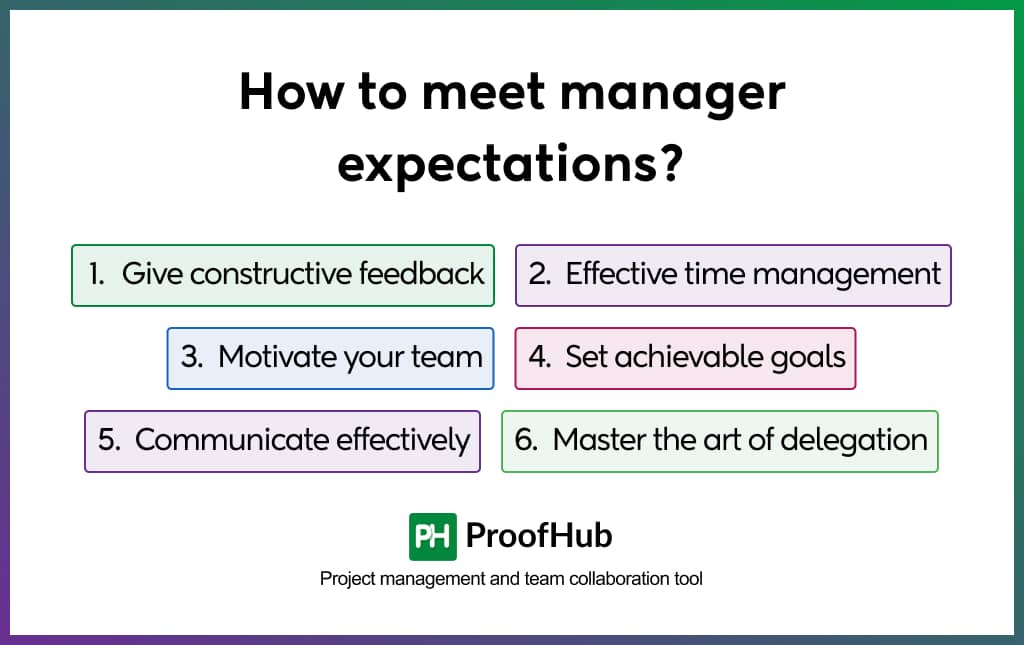Managing multiple projects, keeping your team aligned, communicating with clients, and ensuring no missed deadlines, a project manager’s job is not easy. The expectations from a manager are high. He needs to balance leadership, strategy, and communication skills to keep everything running smoothly.
A manager needs to stay calm, maintain a strong focus, and minimize distractions while being open and considerate towards his team. A good manager can bind a team together and thus ensure the successful execution of projects. The absence of one can affect the future of a team and cause disharmony, thereby derailing projects.
A recent study by Gallup shows that the most common reason that leads people to leave their jobs is the absence of a supportive and understanding manager.
People often quit their jobs when they don’t have a good working relationship with their manager, no matter how many privileges the job gives. To maintain a healthy team spirit, a manager should address the concerns of the team members and constantly push them to do better.
Understanding both parties’ expectations will help you figure out how to become a better leader. This give your employees room to grow and thrive. The expectations from a manager and what employees expect from their managers are discussed in this article.
A Free guide to help you with proven ways to lead a project from start to finish, without confusion or jargon.

Why is it important to set expectations from manager?
Setting clear expectations from a manager is important to provide a clear understanding of what is expected in terms of performance, behavior, and leadership. Clarity of setting expectations ensures that managers know their roles and responsibilities that align with organizational goals and values.
If expectations are not well-defined, it can lead to confusion, inefficiencies, conflicts, and potential failures to meet the goals of the project or organization. By communicating expectations clearly, management can create an environment where managers can thrive and meet the expectations of their team and organization.
Every team member and stakeholders expect a manager to communicate clearly, engage with the team, provide accurate information, and report timely to the management. By setting clear expectations, a manager can understand his role better and focus on the goals.
What are the expectations from a good manager?
We’ve discussed why it’s important to have managerial expectations and how they can turn things around in a team. From team expectations to performance expectations, a manager has to be held accountable for all of them. Now let us dive into the expectations the team and organization have out of a good manager.

1. Transparency
Transparency in the workplace is essential for fostering a positive corporate culture and ensuring employee loyalty and engagement. Whether you work for a major organization or nurturing a tiny start-up, this effective leadership strategy could assist your firm in a variety of ways.
Rather than being the sole person responsible for promoting transparency, it would be better if a manager empowers the entire team to uphold the project’s responsibility.
As a manager, you can win the trust of those you supervise by following the same principles you’ve established for your team and applying them to yourself and your performance. Fostering a culture of transparency also allows for the recognition of accomplishments as well as the correction of errors or mishaps.
2. Strong team culture
Mentorship takes precedence over management in a great team culture. To develop a team’s culture, cultivating leadership will indeed be critical.
A manager must communicate clearly with team members for everyone to be on the same page and for the team to be completely transparent. A good project manager must develop schedules that are flexible enough for everyone to complete their task effectively, but not too flexible that they become unmanageable. As a manager, you are responsible for building a team culture where people work together, respect, and support one another. So it makes it easy for everyone to share ideas and speak up, creating a supportive environment. You should understand the value of celebrating wins, whether it is an individual’s effort or the team’s success and make sure everyone feels proud and motivated.
Great managers should know how to make every team member feel included and appreciated, no matter their role or background. They should create a sense of belonging by encouraging mutual respect and welcoming different ideas and perspectives.
When the whole team works together, they stop being just coworkers; they become a group working for shared goals. By working this way, they become more productive. It creates a workplace where people genuinely enjoy what they do and feel inspired to give their best.
3. Appreciation and recognition
A survey by SHRM Globoforce shows that organizations that have recognition programs in place for their employees experience 28.6% lower frustration levels than those without.
Recognizing employees is a crucial component of a manager’s job. Take the time to appreciate the work they accomplish and how they contribute to the team. The people you manage will carry out the tasks you set for them and keep your department running smoothly. Many employees have grown accustomed to receiving praise for their efforts, but even those who do not expect it will value real praise.
It isn’t just about success and achieving goals that should be celebrated. A strategic recognition program can help you effortlessly recognize micro-moments along the way, such as great work, taking on new responsibilities, or going above and beyond for your team.
4. Accountability
Accountability is an important quality of a good manager. As a manager, you should take responsibility for both the team’s successes and challenges. A manager should lead by example, showing reliability, a strong work ethic, and ownership of their actions and decisions. When things go well, he should make sure to recognize the team’s hard work. When things don’t go as planned, he should be honest about their role and work with the team to find solutions instead of blaming others.
Accountability enhances work relationships, increases job satisfaction, and allows teams to collaborate more efficiently. Workplace accountability is critical to the quality of the output that employees produce. It’s also crucial for fostering strong and healthy working connections.
Workplace accountability helps ensure every team member pulls their weight without relying on others to get the work done for them. If management doesn’t hold employees accountable for their actions, it creates an unfair working environment for employees with the motivation to complete projects on their own.
Holding each other accountable at work helps to accelerate performance, makes team members consistent, promotes satisfaction, establishes trust, and promotes a good work culture.
5. Clear communication
As a manager, you are expected to prioritize communication in the workplace. Ineffective or absent communication can seriously impact a project’s outcome and the organization.
You are expected to ensure workplace communication remains strong, whether team members are working alone or in groups. Across a broad array of industries, the COVID-19 pandemic has resulted in major work and workplace communication changes. More companies are managing the process of effectively moving from in-person to virtual operations.
Working from home has become the preferred mode of working for business. This has changed the role of managers. They need to establish clear communication channels to keep the team aligned.
How to meet manager expectations?
A manager is in charge of the team and is responsible for the people who work for them. Expectations are often placed on you as the team leader and the employees who report to you as a manager.

1. Give constructive feedback
It’s critical to provide frequent and high-quality feedback to your employees. This will benefit both parties because your team will feel more aligned, productive, and effective. As a manager, you’ll have peace of mind knowing that your team understands their responsibilities and that each team member feels comfortable approaching you for feedback.
2. Effective time management
When you are a manager, time management is vital because it allows you to organize your workday so that you may grow your business while maintaining a healthy work-life balance. You’ll need to be more organized than ever before, which involves:
- Continuous planning.
- Blocking time in your calendar.
- Setting reasonable objectives for yourself, given the time limits you now face.
3. Motivate your team
When your employees are motivated, they are more engaged in their work, which has a good impact on the team’s productivity. When you’re a manager, you have a stake in the quality of your team’s work, but you also have a responsibility to help them be happier at work.
Motivating your employees is an essential part of being a good manager and completing your responsibilities. Each of your employees has their own set of abilities, interests, and talents, so finding these and encouraging them to use them to benefit the company and the team will be a fantastic source of inspiration.
4. Set achievable goals
Teamwork in the workplace is based on everyone having the same goals and expectations. Working for a similar purpose can bring people together, engage them in the task at hand, and energize the process. When it comes to things like remote working, this is especially vital.
Having too much pressure to meet expectations, on the other hand, might have the opposite impact, leaving employees exhausted and frustrated. As a result, having attainable goals that the entire team can work towards is critical. Similarly, each member should be responsible for creating their personal goals, leading to accountability, growth, and professional advancement.
5. Communicate effectively
A successful team is built on open and honest communication. This is true whether we’re meeting in person or online because it helps us develop the interpersonal skills needed for efficient teamwork. Everyone is kept informed and in the loop by sharing ideas, points of view, information, and expertise.
For managers and leaders, this includes conveying clearly what needs to be done, what recent successes have been achieved, and which areas require additional emphasis and attention. Giving and receiving feedback, discussing ideas, and listening to one another are all part of communication.
6. Master the art of delegation
Any effective manager or team leader must know which jobs they can handle themselves and delegate to their subordinates. It’s crucial to leave your ego at the door and accept that there aren’t any great managers who can do it all, no matter how big or small the task at hand is.
To evaluate which employees are best suited for the duties at hand, consider your team’s talents and most prominent strengths. Of course, some tasks will remain on your to-do list, but anything that falls outside of your scope should be delegated and given to your team.
How can you manage your team with ProofHub?
It’s difficult being a manager. There always seem to be a million things to think about, a million things to get done, and a million methods to manage people. You need to keep track of everyone’s tasks and responsibilities, which can be very challenging. It’s very difficult to keep everyone aligned and on track. A platform like ProofHub will help you manage everything and keep track of everyone. With ProofHub, you don’t need to track things manually, it will keep everything on track so you can fully focus on the team.
ProofHub is an all-in-one project management and team collaboration software designed for all types of projects, communication and teams.
FAQs
What are the four types of expectations?
The four types of expectations are conditional, rational, set, and unrealistic. Conditional expectations rely on specific results or situations, while rational expectations are predicated on acceptable results. Set expectations are clear standards or goals everyone agrees on, while unrealistic expectations are hard to reach.
What is an example of good expectation?
When a manager expects their team to meet deadlines while providing support and resources to help them succeed. It’s clear, achievable, and encourages accountability. This expectation motivates the team to stay on track without feeling overwhelmed.
How to know if I'm meeting my manager's expectations?
To know if you are meeting the expectations, regularly ask for feedback on your performance from management. Align your tasks with the goals set for you, and ensure you meet deadlines and quality standards. Also, check if you’re contributing to team goals and handling responsibilities effectively.

